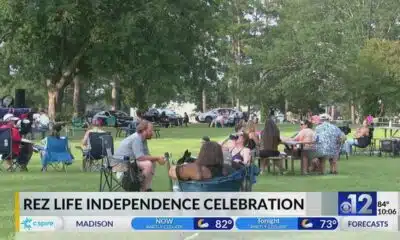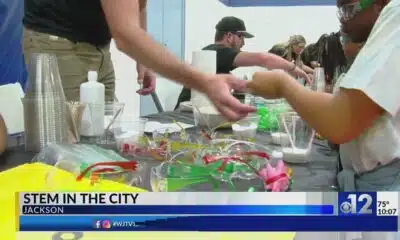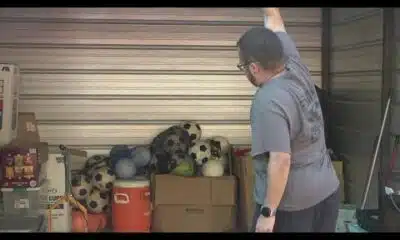Mississippi Today
Q&A with maternal fetal medicine doctor on health care for moms in Mississippi

Dr. Michelle Owens, a maternal fetal medicine specialist, is currently the National Secretary for the American College of Obstetricians and Gynecologists (ACOG), the president of the Mississippi State Board of Medical Licensure and the clinical director at Mae Health. She has been practicing as an OB-GYN in Mississippi since 2004.
Owens spoke with reporter Pam Dankins following the death of three-time Olympic medalist Tori Bowie, from Sandhill, Mississippi.
In early May, Bowie was found deceased at her Florida home. According to the autopsy report issued by the Orlando medical examiner’s office, the 32-year-old was eight months pregnant, alone at home and undergoing labor at the time of her death. The 2012 University of Southern Mississippi graduate reportedly experienced complications such as respiratory distress and eclampsia, a rare high blood pressure condition linked to seizures.
Kimberly Holland, Bowie’s agent, stated to CBS that Bowie didn’t trust hospitals.
For Black women in Mississippi and across the United States, pregnancies and child births are even more dangerous. In Mississippi, the pregnancy-related mortality ratio had increased from 33.2 to 36.0 deaths per 100,000 live births in the span of three years.
The same report further showed the pregnancy-related mortality rate of 65.1 deaths per 100,000 live births for Black women was more than quadruple the death ratio for white women.
Owens explained in a sit down with Mississippi Today that policymakers, health care providers and communities must address underlying factors – hypertension, mental health, infections, etc. – within maternal health in order to ensure that all women, regardless of race or ethnicity, have access to care and support.
This interview has been edited for clarity and length.
Pam Dankins: What was your reaction to the news of Tori Bowie’s death?
Michelle Owens: Well, I think my response might have been a little different because I have been doing work in this space. For me, I think it was sadness also mixed with a tinge of frustration because Tori wasn’t the first, and this is something that is increasingly more common. When I think about the people who I’ve had the privilege of caring for, who are in many instances, people from underrepresented groups and from marginalized communities, this is way too common in those communities.
It makes you think, ‘What can you do? Who is immune?’ You can be a highly competitive athlete at the top of your game, and this still occurs. Some of the complications of pregnancy are not just set aside for those people who are unhealthy.
The truth is that pregnancy complications, life-threatening pregnancy complications, can also occur in those people who we would think of as being, you know, the epitome of health. And so, it was frustrating and sad because we know that a lot of these deaths could be preventable. Every death is one more too many.
Dankins: What has been done to reduce maternal mortality in the state?
Owens: So in Mississippi, since 2017, we have a maternal mortality review committee (MMRC), and that committee has been charged with the responsibility of reviewing maternal deaths. They take a deeper dive into each of those situations and make recommendations about the issues that we discover that ultimately, will hopefully, help to decrease mortality rates.
Our State Health Officer Dr. Dan Edney has decided to elevate maternal health as one of the priorities during his tenure. He’s tried to help by not only spreading the word but engaging the medical community and community partners by using the State Department of Health as a vehicle. This way the general public can be aware of the risks and how pregnancy complications can influence not only maternal health, but also health across the lifespan of a birthing person.
There are community organizations that are spread across the state, and there are community partners who are working to help raise awareness. For instance, Mom Me is an organization that kind of focuses on maternal mental health services. Six Dimensions is another organization that is really interested in helping to improve outcomes among Black birthing people.
I think through our Perinatal Quality Care Collaborative (a network of teams collaborating with the state Health Department to improve maternal and infant care), the MMRC (maternal mortality review committee) and the assistance of our state health officer, there’s a lot of positive movement in spreading awareness and helping people to understand the problem. The maternal health crisis is not just in Mississippi but in our country. And, the people who tend to know the least about it are the ones who are at the greatest risk and sense of potentially being most affected.
Dankins: How can you spread awareness to people who may have trouble accessing this information?
Owens: Well, I think the most important thing is meeting people where they are. It’s talking to people in where they live, like at churches and at sporting events. I hope that people understand that we can’t take our health for granted. And just because you are quote, healthy or healthier than most, it still doesn’t mean that you can’t have a life-threatening complication, especially when it pertains to pregnancy. I think that we need to be talking about this in our communities, neighborhoods, Facebook groups, group chats with our friends and wherever there are groups of people who care about each other. It needs to be part of the conversation.
Because only through making sure that people have awareness, do we really make significant strides in closing gaps once people have the awareness.
We also have to make sure that the people who are supposed to be listening, are listening and responding. It’s not entirely on the families of these individuals and themselves. There is a substantial portion of that burden that is also carried by the health care community, that when these concerns are raised, that we are doing our due diligence to fully investigate them in order to ensure that people are getting the care that they need and deserve.
Dankins: Why, with all of the resources the United States has, do we rank so poorly in this area in Mississippi specifically?
Owens: The answer to that is multifactorial.
I think we have challenges as a primarily rural state, and we have the challenge of maternal health deserts. There are so many counties within our state where people don’t have ready access to women’s health services. Like obstetrical care, how many places can you deliver? How many hospitals actually perform deliveries? How many places actually have an OB-GYN, a nurse midwife or a family medicine doctor who performs deliveries? Number one, there aren’t a lot of people that are doing this work. Number two, those people tend to be more highly concentrated in more populous areas. And so, our rural areas of the state have specific challenges because there can be broad swaths of land where there’s nobody providing care.
There are, of course, social challenges. I mean, the vestiges of structural racism that exist within our state, and not just our state, but within this part of the country. The socioeconomic divide and issues with people not being able to access affordable health care. Fortunately, most of the people who would fall into that category when they’re pregnant would have access to Medicaid, and thankfully now, will have coverage for up to a year after birth. Those are some of the small wins that hopefully will help to make a difference but there are many challenges.
That’s why it is going to take a concerted effort on all fronts for us to see the change that is needed. Because it’s not like there’s just one main contributor to the problem. There are several small things that we have to really work on. And once we do it right for a while, we have to be consistent and maintain our vigilance as we’re working to optimize maternal health. We can’t do it for a couple of years, see our numbers get better and then go back to the way things were. We have to make sure that the changes that we implement are sustainable, and that they continue to be passed on. We have to spread the things that work from institution to institution and from providers and practices on to other providers and other practices, so that we see this as a sustainable improvement for our state.
This article first appeared on Mississippi Today and is republished here under a Creative Commons license.
Mississippi Today
Mississippi school superintendents indicted on fraud charges
The superintendents for Leake County and Hollandale school districts and a consultant have been indicted on four federal counts of conspiracy to commit embezzlement, theft and bribery.
According to the indictment, Earl Joe Nelson, while superintendent of Clarksdale Municipal School District and now Leake County School District, and Mario D. Willis, as superintendent of Hollandale School District, allegedly paid each other tens of thousands of dollars in school funds for consultant services that were never rendered from November 2021 until at least June 2023.
Additionally, the duo is accused of stealing U.S. Department of Education funds that were intended for their respective districts.
A St. Louis-based consultant and teacher, Moneka M. Smith-Taylor, has also been indicted on bribery charges in connection with the case. She allegedly received more than $250,000 from Willis for consulting services that were never provided over the course of two years.
She returned part of that money to Willis in the form of a cash kickback in return for the consulting contract, the indictment says.
A spokesperson for the Mississippi State Department of Education directed Mississippi Today to local school boards, who make personnel decisions for their respective districts, for comment.
The job status of the two superintendents is unclear. District officials could not be reached by presstime, but Willis is still listed as the superintendent of Hollandale School District and Nelson is still listed as the superintendent of Leake County School District in the state education department’s online directory.
It’s also unclear whether the defendants have a lawyer who could speak on their behalf.
This article first appeared on Mississippi Today and is republished here under a Creative Commons Attribution-NoDerivatives 4.0 International License.
The post Mississippi school superintendents indicted on fraud charges appeared first on mississippitoday.org
Note: The following A.I. based commentary is not part of the original article, reproduced above, but is offered in the hopes that it will promote greater media literacy and critical thinking, by making any potential bias more visible to the reader –Staff Editor.
Political Bias Rating: Centrist
The article reports on the indictment of two Mississippi school superintendents and a consultant on federal fraud charges in a straightforward, factual manner. It presents the legal allegations without editorializing or taking a stance. The language is neutral and focused on relaying verified information from the indictment and official sources, without suggesting guilt or innocence. There is no evident ideological framing or advocacy; rather, the piece sticks to reporting the details of the case and the status of the individuals involved. Thus, the article adheres to objective journalistic standards without discernible political bias.
Mississippi Today
Defendant in auditor’s ‘second largest’ embezzlement case in history goes free
Four years ago, agents from the state auditor’s office arrested Tunica nonprofit operator Mardis Jones in what the office trumpeted as the second-largest embezzlement case in its history and demanded Jones return over $1 million to the state.
The charges accused Jones of stealing $750,000 from a home rehabilitation program he was supposed to be administering while turning away needy rural residents living in crumbling houses.
But his defense attorney attacked holes in the case, and last month, a local jury found Jones not guilty of the criminal charges. Now, the state has made no indication it will bring a civil case to try to claw back the money from him.
Jones’ nonprofit Tunica County Housing Inc. secured a subcontract with the county through the North Delta Regional Housing Authority in 2014 to run the county’s home rehabilitation program funded with casino revenue. For his work, vetting applications and managing expenses, Jones earned $12,000 a month.
At the core of the criminal case were “strange money transfers” and a finding that several of the people whose applications for home rehab were approved allegedly never received any repairs to their homes. According to the auditor’s office, investigators found less than 20% of the nearly $2 million Jones’ nonprofit received went to the contractors working to rehab homes.
“Once again, an arm of government trusted a private organization to run a government program, and a large percentage of the program’s spending was flat out stolen,” State Auditor Shad White said in a press release after the arrest.
Attorney General Lynn Fitch echoed White, saying, “These funds – hundreds of thousands of dollars – were meant to help the elderly, handicapped, and poverty stricken. But the funds never got to the vulnerable citizens who needed it most.”
Jones’ lawyer Carlos Tanner explained to Mississippi Today that the program operated with an extreme backlog, and that “some of the people they were claiming didn’t get their houses done actually did” by the time the trial was held this year.
The program was poorly administered, Tanner said, meaning that even if a person’s application was approved and a rehab contract prepared, county officials could direct Jones to put someone else’s repair job ahead of his or hers.
“But just because it was run like a first weekend lemonade stand does not mean Mardis Jones stole money,” Tanner said.
Tanner said the investigators gathered paltry evidence, only looking at details that fit their narrative. While Jones did earn a large salary through his contract, Tanner said prosecutors never presented evidence that Jones converted money that was supposed to be used on home rehabilitation to his personal use.
Investigators got a warrant to seize Jones’ electronics, Tanner said, but “they never bothered to search it.”
“The two OSA (Office of the State Auditor) officials who were running the investigation, I questioned them about it during trial, and neither of them could tell me where the computer was, where the phone was, or what the contents were,” Tanner said.
Jacob Walters, a spokesperson for the auditor’s office, defended the way the investigators handled the case, saying, “The state auditor’s office is never going to turn a case we investigated over to a prosecutor unless we’re fully confident in the work that we did.”
At the time the auditor’s office announced the Jones arrest, it also said it delivered a demand letter ordering Jones to repay over $1 million, the money it alleged he stole plus interest and investigative expenses.
It’s up to the attorney general or local district attorney to decide how to prosecute auditor investigations, or in Jones’ case, what happens to the civil demand now that a jury found him not guilty in the criminal case.
When a person receives a demand alongside his or her arrest, regardless of what happens with criminal charges, the claw back can be enforced through civil litigation — much like the case against several defendants in a stunning Mississippi Department of Human Services fraud case, which began in 2020 and has yet to be resolved. Walters said the demand against Jones is still the office’s next-largest in history, second only to the welfare scandal.
The government might choose to pursue civil litigation, even if criminal prosecution is unsuccessful, because there is a lower burden of proof to win civil cases.
But the attorney general’s office told Mississippi Today last month that it had not received the Jones demand letter from the auditor, meaning it has nothing left to enforce.
Walters said the auditor’s office sent the letter along with the case file four years ago, but that with a turnover in attorneys prosecuting the case, the auditor had to resend the file last year. If the attorney general’s office no longer possesses the demand document, Walters said, “it’s an incredibly easy problem to resolve.”
“Just reach out to us with a single phone call or email and we can get it to you,” Walters said.
After the interview, the auditor’s office sent the demand letter by email, and the attorney general’s office confirmed it was received.
This article first appeared on Mississippi Today and is republished here under a Creative Commons Attribution-NoDerivatives 4.0 International License.
The post Defendant in auditor’s ‘second largest’ embezzlement case in history goes free appeared first on mississippitoday.org
Note: The following A.I. based commentary is not part of the original article, reproduced above, but is offered in the hopes that it will promote greater media literacy and critical thinking, by making any potential bias more visible to the reader –Staff Editor.
Political Bias Rating: Centrist
This article presents a factual and balanced account of the embezzlement case involving Mardis Jones without overt ideological framing. It reports statements from both government officials criticizing the alleged misconduct and the defense attorney’s rebuttals, highlighting weaknesses in the prosecution’s case. The tone remains neutral, avoiding partisan language or loaded terms. It focuses on the procedural aspects, jury verdict, and potential civil actions without advocating for a political viewpoint. The article provides context from multiple perspectives, adhering to objective reporting rather than promoting a specific ideological stance.
Mississippi Today
JPD called ICE on Miss. father, who faces deportation
Kerlin Moreno-Orellana is facing deportation over a misdemeanor charge that usually results in a fine. He was picked up by Immigration and Custom Enforcement agents on Thursday morning and transferred from the Raymond Detention Center to an ICE detention center in Louisiana.
On June 16, Jackson police arrested Moreno-Orellana, a contractor, in south Jackson along with his employer Christy Parker, who was showing him one of the old properties she worked on. Both were charged with illegal dumping, but Parker claims they did not dump anything.
After detaining them, Jackson police called a local TV outlet, 16 WAPT News, to come shoot the scene of the arrest. Parker said they were kept in the police car for over an hour, waiting for the news crew. The WAPT newsroom explained that the Jackson police routinely asks them to cover arrests related to illegal dumping or other high profile cases, in order to “dissuade people.”
Once at the station, the Jackson Police Department called ICE on the 35-year-old father of four, who had worker authorization documents. He was kept in jail overnight, while Parker was released hours after their arrest.
“He didn’t do anything I didn’t do,” Parker said in an interview with Mississippi Today. “But because I’m white, I’m here?”
A municipal court ordered Moreno-Orellana’s release the day after, but ICE placed a detainer on him – a formal request to keep a non-citizen in custody for 48 hours, while the agency investigates. It is not an arrest warrant. However, a state law passed in 2016 mandates that all local law enforcement comply with ICE detainers placed on undocumented immigrants.
“What we are doing today is no different than what we’ve always operated when the detainer is sent by ICE to the jail,” said Hinds County Sheriff Tyree Jones. “Nothing has changed.”
While the Hinds County Sheriff’s Department has historically worked with ICE, Jackson police actively seeking out ICE to detain people is a fairly recent occurrence, said Mississippi-based immigration attorney Jeremy Litton. Jackson police did not respond to a request for comment.
ICE picked up Moreno-Orellana with hours left on his detainer, and he now faces deportation. ICE spokesperson Lindsay Williams said that Moreno-Orellana violated the conditions of a past bond agreement by being arrested for a new charge. He had already spent over a month in ICE custody in 2019, after getting arrested by park rangers for speeding and driving without a license.
Still, a minor misdemeanor charge – like illegal dumping – is normally insufficient for ICE to threaten to deport someone with worker authorization paperwork. Removal of a person with documentation is usually justified if the person is deemed a threat to public safety or national security.
“This does feel like a result of the elevated focus on deporting people from the Trump administration,” said Matt Steffey, professor at the Mississippi College School of Law.
Moreno-Orellana, who is from Honduras, has three boys and a girl, the youngest of whom is less than a year old. He has lived in Mississippi for over 16 years. Colleagues describe him as a valuable worker and a good friend.
“All he ever did was work and go home,” Parker said. “He was always willing to give somebody help.”
The possibility of his deportation is leaving his family in a precarious situation. Moreno-Orellana was the sole breadwinner of the family, and his wife worries about sustaining herself and their children without him.
“I’ve always dedicated myself to taking care of my kids at home, and he’s the one who brings food to the table,” his wife said in Spanish. “I’m afraid of staying, being without my children’s father. Not so much for me, but because they need him.”
This article first appeared on Mississippi Today and is republished here under a Creative Commons Attribution-NoDerivatives 4.0 International License.
The post JPD called ICE on Miss. father, who faces deportation appeared first on mississippitoday.org
Note: The following A.I. based commentary is not part of the original article, reproduced above, but is offered in the hopes that it will promote greater media literacy and critical thinking, by making any potential bias more visible to the reader –Staff Editor.
Political Bias Rating: Center-Left
This article primarily reports on the actions of law enforcement and ICE with a focus on the human impact of deportation on a Mississippi family. While the reporting remains factual, the framing and choice of quotes highlight concerns about racial disparities, immigration enforcement policies, and potential overreach by authorities, suggesting a subtle critical tone toward current immigration enforcement practices. The article’s emphasis on the family’s hardship and the legal nuances involved positions it slightly left-of-center, sympathetic to immigrant rights and critical of aggressive ICE actions. However, it avoids overt ideological language, maintaining largely balanced coverage.
-
News from the South - Tennessee News Feed6 days ago
Thieves take thousands of dollars in equipment from Union County Soccer League
-
Mississippi Today4 days ago
Defendant in auditor’s ‘second largest’ embezzlement case in history goes free
-
News from the South - Texas News Feed6 days ago
Robert Nichols to retire from Texas Senate
-
News from the South - Louisiana News Feed6 days ago
3 lawsuits filed against CVS, Louisiana AG announces
-
News from the South - Texas News Feed7 days ago
ACLU, student group to sue Texas over expansive 'parental rights' bill
-
News from the South - Missouri News Feed5 days ago
Residents provide feedback in Kearney Street Corridor redevelopment meeting
-
News from the South - Alabama News Feed6 days ago
News 5 NOW at 12:30pm | June 24, 2025
-
News from the South - Alabama News Feed7 days ago
New Spring Hill hotel would replace former armory


















































